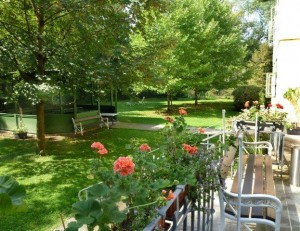
More evidence that low-calorie sweeteners are bad for your health
Studies show that artificial sweeteners can raise the risk of hypertension, metabolic syndrome, type 2 diabetes and heart disease, including stroke.

Natural Health News — Access to gardens and green spaces whilst in hospital can help patients recover faster.
This is the key finding of an environmental and psychological case study of natural gardens around three Austrian hospitals.
“The more natural the garden, the greater the experience,” said lead researcher Renata Cervinka from the Institute for Environmental Hygiene at the Centre for Public Health, Vienna.
“The gardens and green spaces of a hospital should be regarded as a counterbalance to the hospital itself,” she says. “The garden is perceived as a natural contrast to the hospital – it serves as a place of sanctuary and recuperation.”
The researchers also conducted an online survey to discover what potential patients think of as the ‘perfect’ hospital garden. Green, very natural landscaped gardens came closest to the ideal.
This result also echoes the findings of earlier studies. As far back as 1984, Roger Ulrich PhD or Texas A&M University discovered that a view from the hospital room overlooking green spaces has more of a “healing” effect than a view of a concrete wall.
Patients with a view of green space spent less time in the hospital, were generally more happy with their care and required less pain-relieving medication.
A three minute break
Just three minutes in the garden, say the researchers, can have positive effects.
“Deep breathing in a green space for just three minutes can have a positive effect,” says co-author of the Austrian study Kathrin Rödere. “The smoking break is firmly entrenched in modern life, however the ‘mental’ break isn’t, unfortunately.”
This break has even more impact the more the gardens and places of sanctuary are tailored to the needs of their users.
“At a general hospital, for example, where patients do not stay for very long, even a view of the appropriately-landscaped green space can have a health-promoting effect. For other groups, such as patients undergoing orthopaedic rehabilitation, it is more important that the gardens can also be enjoyed while using walking aids, for example. Long-term patients, such as geriatric or psychiatric patients, particularly benefit from activities involving gardening.”
“The value of nature is incalculable”
The authors also recommend separate green areas for hospital personnel that are private from the patients.
“The proven therapeutic effect should also counteract the trend towards regarding green spaces as purely places of rest or potential building plots,” says Cervinka. “The value of nature is incalculable. Its worth is priceless.”
With this in mind, the study authors also point out how crucial it is to preserve large, old trees when carrying out extensions and conversions: “Trees have a very important role to play in recovering from stress and in mental health. They are easily felled, however they take a long time to grow.”
On the basis of the study findings, a checklist has been developed that can be used to create the ideal design for hospital gardens – with the aim of lifting the mood of their users, promoting their wellbeing and increasing the gardens’ proximity to nature.

Please subscribe me to your newsletter mailing list. I have read the
privacy statement